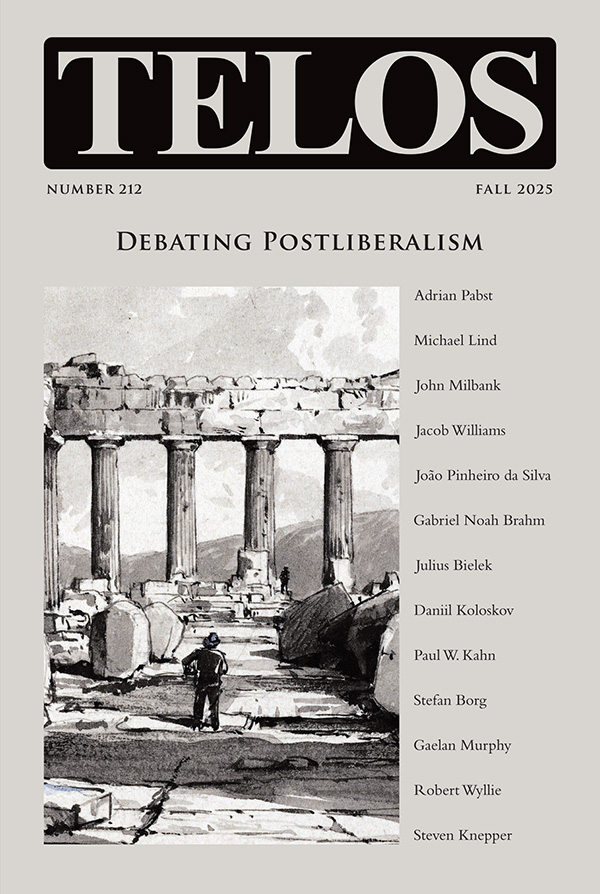Telos 212 (Fall 2025): Debating Postliberalism is now available for purchase in our store. Individual subscriptions to Telos are also available in both print and online formats.
 In 1998, Alan Wolfe remarked that “the right won the economic war, the left won the cultural war, and the center won the political war.” It was the age of triumphant liberalism, freed from the shackles of the Cold War confrontation between the capitalist West and the Communist East. Capitalism was now the uncontested model, as Western countries increasingly abandoned a more embedded social market economy in favor of the global market-state while emerging market economies embraced the state-market. In each case, society was the loser. Even as countries converged internationally and China morphed into an economic powerhouse, asset and income inequality increased within countries, and so did regional disparities—between the former heartlands of the Rust Belt and the new metropolitan hubs exemplified by Silicon Valley. Building on the writings of Paul Piccone and Christopher Lasch, critics of liberalism such as Christophe Guilluy, Nancy Fraser, Michael Lind, and Quinn Slobodian have highlighted the growing gulf between elite enclaves and peripheral wastelands, or hubs vs. heartlands, but their analysis has mostly been dismissed as nostalgic or downright reactionary. Something similar applies to politicians on both sides of the spectrum who have questioned liberal economics—whether Pat Buchanan in the past or JD Vance and Josh Hawley more recently on the Republican right, or Bernie Sanders, Ro Khanna, and Chris Murphy on the Democratic left.
In 1998, Alan Wolfe remarked that “the right won the economic war, the left won the cultural war, and the center won the political war.” It was the age of triumphant liberalism, freed from the shackles of the Cold War confrontation between the capitalist West and the Communist East. Capitalism was now the uncontested model, as Western countries increasingly abandoned a more embedded social market economy in favor of the global market-state while emerging market economies embraced the state-market. In each case, society was the loser. Even as countries converged internationally and China morphed into an economic powerhouse, asset and income inequality increased within countries, and so did regional disparities—between the former heartlands of the Rust Belt and the new metropolitan hubs exemplified by Silicon Valley. Building on the writings of Paul Piccone and Christopher Lasch, critics of liberalism such as Christophe Guilluy, Nancy Fraser, Michael Lind, and Quinn Slobodian have highlighted the growing gulf between elite enclaves and peripheral wastelands, or hubs vs. heartlands, but their analysis has mostly been dismissed as nostalgic or downright reactionary. Something similar applies to politicians on both sides of the spectrum who have questioned liberal economics—whether Pat Buchanan in the past or JD Vance and Josh Hawley more recently on the Republican right, or Bernie Sanders, Ro Khanna, and Chris Murphy on the Democratic left.
Some political and policy differences notwithstanding, the mainstream left and right—in the United States, Europe, and other Western countries such as Japan, South Korea, Australia, and New Zealand—took a progressive turn and embraced untrammeled markets, hyper-individualism, and foreign military adventures. The ruling elites felt vindicated by the “end of history” utopia of a global convergence toward liberal market democracy and the inevitable forward march of globalization. Both liberal interventionists and neoconservative crusaders advanced the vision of America as a liberal Leviathan that secures the social contract at home and U.S. supremacy abroad.


